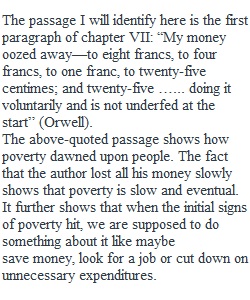


Q Interpreting Orwell, Ch. I-VII *Please participate in this discussion activity only after completing the first Orwell reading assignment and the first Reading Response. You will start this activity by sharing the second part of your Reading Response, the inference response, which asked you to apply metaphorical thinking to a passage or quote to determine what it says about poverty. Another student will then help you to further develop your interpretation of the quote or passage. This activity will give you a chance to develop the metaphorical thinking skills needed to integrate Orwell's writing into your own research synthesis essay. You can also use ideas and interpretations generated in this discussion in the essay. Your Task STEP ONE: Make your first post (10 points). • Share your inference response. You can simply copy what you've already written in your Reading Response. o If the quote is reasonably short, include it in your post. If not, summarize it. Make it clear where the passage can be found, and provide some context about what happens before the quote if needed. o After the quote, you should have your inference response: What does the passage say about what causes poverty, what the experience of poverty is like, or how it affects peoples’ relationships, emotions, psychology, health, etc.? . STEP TWO: Respond to someone else's post (15 points, at least 150 words). • Your job in this response in not to simply agree or disagree with your classmate's interpretation. Instead, you're providing something new, an additional interpretation of the passage your classmate has chosen. • Identify a post you find interesting and respond to it. • Look closely at the passage included in the original post. Assume every detail is there for a reason, conveying a meaning. Use the same type of metaphorical thinking we applied to the “Charlie & the Peasant Girl” passage. • What else, in addition to your classmate's original interpretation, could the passage be implying about what causes poverty, what the experience of poverty is like, or how it affects peoples’ relationships, emotions, psychology, health, etc.? Follow-up activity *You don't have to turn anything in for this follow-up activity to the required discussion assignment. • Review your classmates' posts, not just the one you responded to. You'll see a lot of interesting examples of • metaphorical thinking here. • Then review your notes: “Poverty in 21st c. America” • Free-write (“Essay 3 Notes”): Based on this discussion , are you seeing any important similarities or difference • between poverty in our own time and poverty in Orwell’s? • Identify one or two similarities or differences you might be interested in researching.
View Related Questions